Content Management Systems (CMS) have transformed how digital content is created and managed. A content management system (CMS) is a software tool that enables web users to create, manage, and distribute digital material without considerable technical experience.
CMSs provide users with an intuitive interface for producing and modifying information and facilitate collaboration among several users on a single project.
There are numerous types of content management systems available, including open-source and proprietary options with diverse features and capabilities.
The most popular content management systems (CMSs) are constructed with PHP language, a widely used server-side scripting language for web development.
According to BuiltWith, there are more than 4.4 million websites utilizing PHP CMSs as of March 2023, with WordPress accounting for more than 4 million of these sites. WordPress is the most famous content management system in the world, powering over 40 percent of all websites on the web. It is followed by Joomla (about 3%) and Drupal (around 2%)
In this blog, we’ll educate you on some of the top PHP CMSs currently available and offer you the knowledge you need to choose the ideal CMS for your unique goals and level of expertise.
There exists a PHP CMS that can help you achieve your objectives, whether you’re designing a simple website or managing a huge enterprise-level project.
Top 12 PHP CMS
-
WordPress
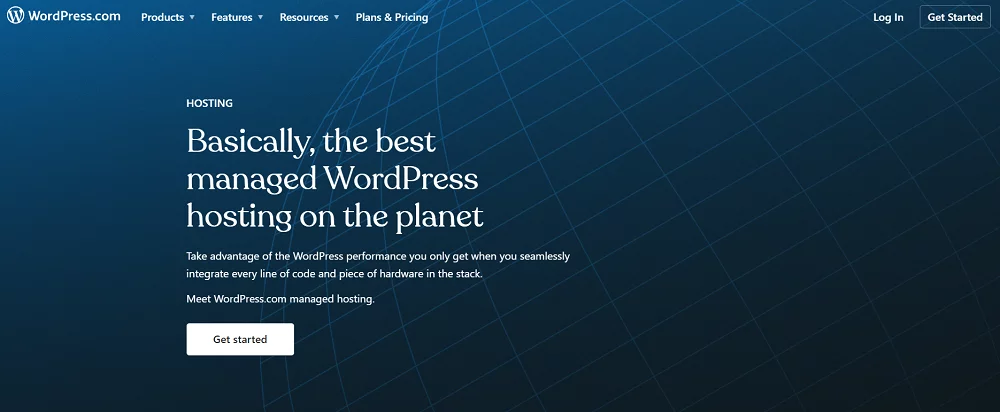
Presently, WordPress is likely the most renowned CMS platform available. PHP powers more than 40 percent of all websites on the internet and has a large development and user community.
WordPress is written in PHP and stores data in a MySQL database. It is a world-famous open-source platform, meaning its usage, modification, and distribution are free.
Features:
- Large selection of plugins and themes available for customization User-friendly interface for managing content Support for a range of content formats, including blog posts, pages, and media assets
- Robust development and user community with regular upgrades and security
Pros:
- User-friendly even for those who are not developers
- It is very customizable and includes a huge selection of themes and plugins
- There are numerous SEO plugins available, and it has outstanding SEO capabilities
- It has a sizable developer community that frequently produces new plugins, themes, and upgrades
- It has a minimal entry barrier and is free to use
Cons:
- WordPress may be a target for hackers and security flaws because of its popularity.
- The performance of the website can occasionally be slowed down by the heavy use of plugins.
- Personalization occasionally calls for highly skilled developing abilities.
- For new users, the platform can be challenging to navigate.
-
Joomla
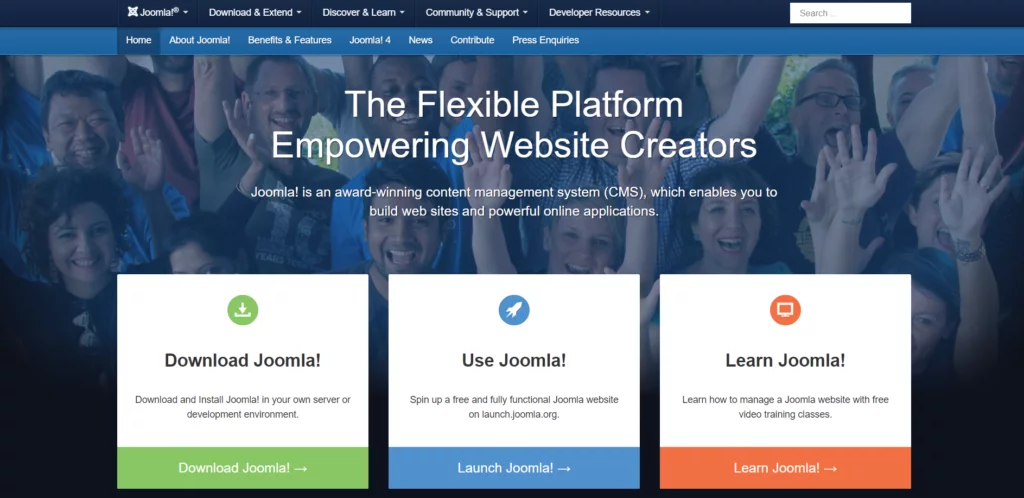
Another well-known PHP-based CMS platform is Joomla. While being less well-known than WordPress, it has a strong user and developer community.
Furthermore, it is open-source and cost-free. It is well renowned for its strong security features and makes use of a MySQL database.
Features:
- Easy-to-use interface for organizing content Vast range of available plugins and extensions
- Versatile and adaptable
- Loaded with options for handling complicated tasks
Pros:
- Thanks to its strong security features, Joomla is frequently used for sensitive and e-commerce websites
- It features a huge selection of templates and extensions and is quite configurable
- It can handle huge traffic and is suited for both small and large websites
- It is simple to develop multilingual websites because of its built-in multilingual capability
- The platform has a passionate user and development community
Cons:
- Not as common as alternative CMS choices
- Minimal assistance compared to alternative possibilities
- For more sophisticated projects, extra development experience can be needed
-
Drupal
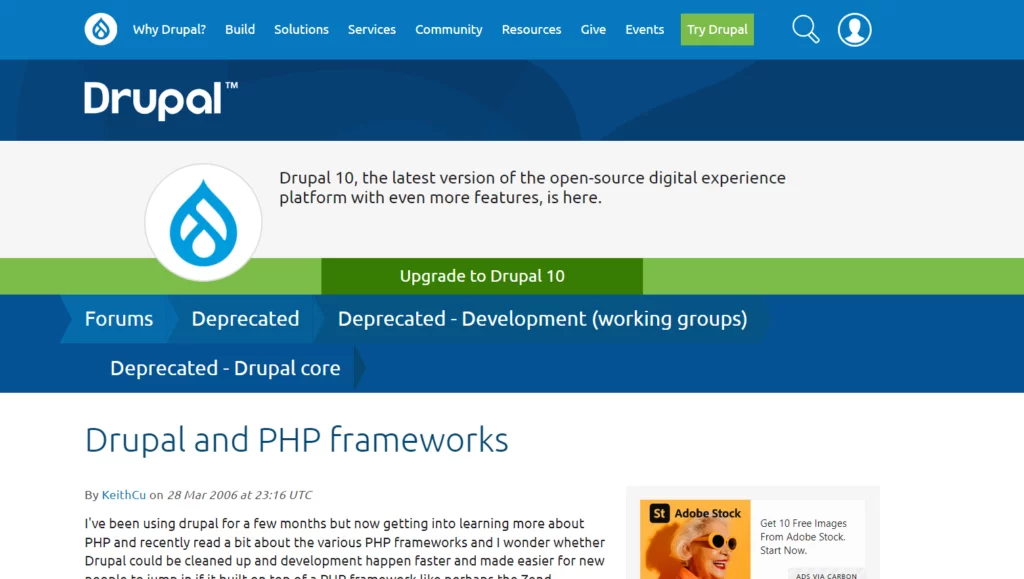
Known for its scalability and flexibility, Drupal is another well-liked PHP content management system. It is frequently employed for expansive, intricate websites with a lot of material and sophisticated features.
Because of its modular nature, Drupal’s comprehensive set of core functionalities may be tailored by developers to meet their unique requirements. Also, it has a sizable community of users and developers who contribute to its growth and support.
Features:
- Scalable, adaptable, and packed with tools for managing complicated projects
- Thriving developer and user communities
- Packed with advanced features, such as custom content types and taxonomies, for managing and organizing content
Pros:
- Scalable and adaptable
- Great architecture in modules
- Strong and widespread user and developer community
- Dependable set of fundamental characteristics
Cons:
- Beginner’s learning curve is steep
- Not as user-friendly as alternative CMS choices
- Compared to other possibilities, there is a small number of plugins and themes
-
Magento
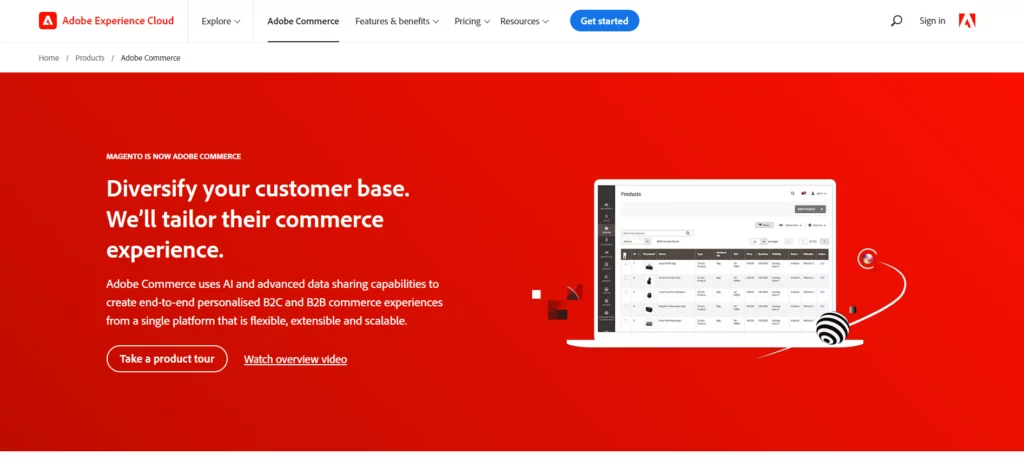
Popular PHP CMS Magento was created primarily for e-commerce websites. It provides a rich collection of capabilities for handling product listings, sales, and customer data, and it is very adaptable and expandable.
In order to increase the functionality of Magento, a sizable ecosystem of plugins and themes can be used.
Features:
- Strong capabilities for handling large e-commerce websites, such as shipping choices, payment gateway integration, and inventory management
- Modular architecture enables flexibility and personalization.
- Consistent updates and robust security features
Pros:
- Specifically made for e-commerce websites and is highly scalable
- a comprehensive set of tools for controlling product listings and sales
- large plugin and theme ecosystem
Cons:
- It may require a lot of resources and can be slow
- Minimal assistance compared to alternative possibilities
- Requires some knowledge of development to effectively customize and administer
-
OpenCart
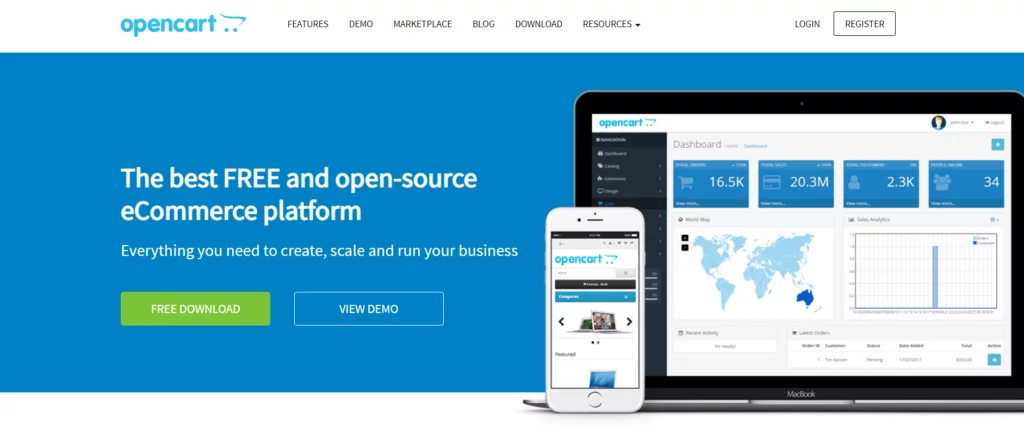
The PHP-based e-commerce platform OpenCart enables programmers to build powerful web stores. Being open-source, it is available for free and has a sizable user and developer community.
1OpenCart has a user-friendly design, lots of customization options, and is simple to set up and use. Moreover, a variety of plugins and themes are available for it that can be utilized to increase its usefulness.
Features:
- Simple setup and installation procedures
- Variety of tools for managing e-commerce sites, such as shipping choices, payment gateway connection, and product management
- Many plugins and extensions are available.
Pros:
- Simple to assemble and use
- Large user and developer community
- Numerous opportunities for customization
- Wide variety of plugins and themes
Cons:
- Compared to other e-commerce platforms, it is less scalable.
- Certain plugins and themes might not work properly or be out of date.
- Lack of assistance for more sophisticated websites
-
PyroCMS
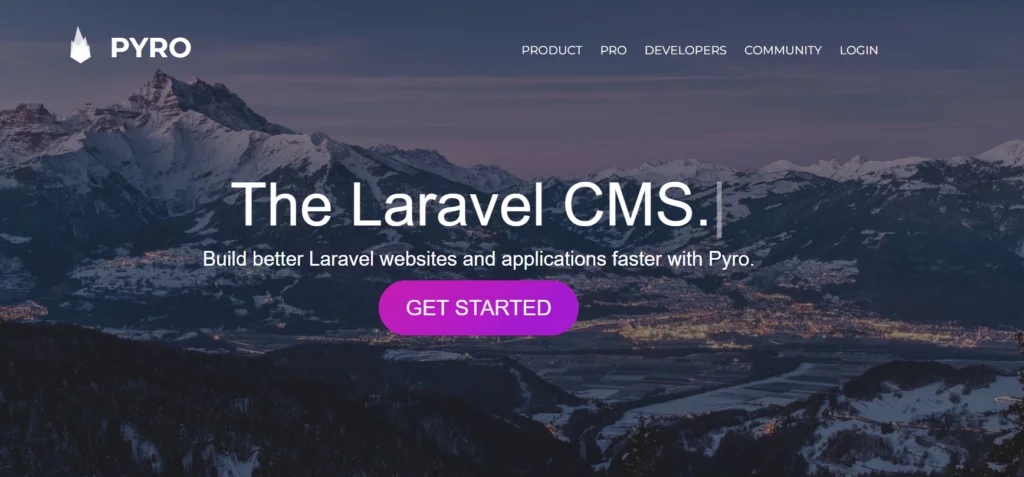
PyroCMS is a PHP and Laravel modular content management system that enables programmers to construct unique websites and applications.
With a straightforward yet effective interface that makes it simple to manage content and personalize your website, it is made to be adaptable and user-friendly. With a modular framework that enables developers to add or remove features as needed, PyroCMS is also very scalable.
Features:
- PHP-built modular content management system
- Adaptable using a variety of modules and themes
- Easily navigable interface for content management that supports internationalization and many languages
Pros:
- Simple interface
- Extremely adaptable and customizable
- Easy scalability thanks to modular architecture
- Built using the well-known PHP framework Laravel
Cons:
- Fewer plugins and themes are available in comparison to other CMS choices.
- Lack of assistance for more sophisticated websites
- Beginner’s learning curve is steep
-
OctoberCMS
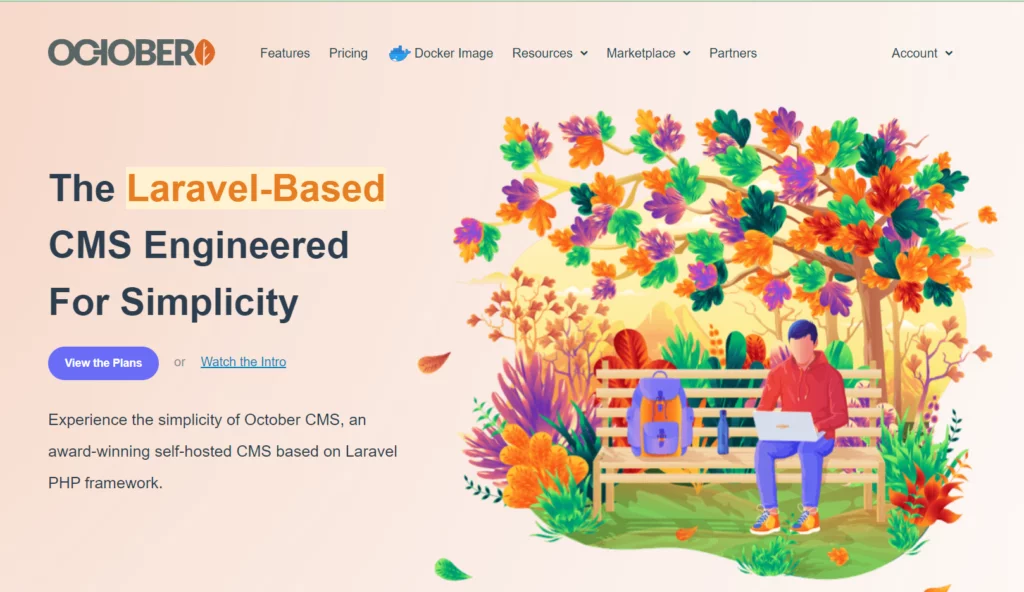
Another PHP and Laravel-based modular content management system with a reputation for versatility and scalability in OctoberCMS. It offers an easy-to-use interface that makes managing content and customizing your website straightforward.
With a large selection of themes and plugins that can be utilized to provide new features and functionality, OctoberCMS is also quite extensible.
Features:
- Modular architecture enables flexibility and personalization.
- Content management interface with support for multi-site management and localization
Pros:
- Easy-to-use interface
- extremely scalable and adaptable
- Modular design for simple customization
- Several plugins and themes are available
Cons:
- Beginners have a difficult learning curve.
- Lack of assistance for more sophisticated websites
- Certain plugins and themes can be antiquated or untrustworthy
-
TYPO3

Built using PHP, TYPO3 is a powerful and adaptable CMS renowned for its enterprise-level capabilities and scalability. It has a large selection of plugins and extensions that can be used to personalize and increase its capabilities, and it is open-source and free to use.
TYPO3 has a robust user and developer community that contributes to its development and maintenance, and it is also quite secure.
Features:
- PHP-based enterprise-level CMS
- Scalable, adaptable, and packed with tools for managing complicated projects
- dependable security measures
- Several plugins and extensions are available
Pros:
- Enterprise-level features and scalability
- Variety of addons and plugins
- Extremely secure
- Thriving developer and user communities
Cons:
- Beginners have a difficult learning curve
- Minimal assistance compared to alternative possibilities
- For more sophisticated projects, extra development experience can be needed.
-
Contao
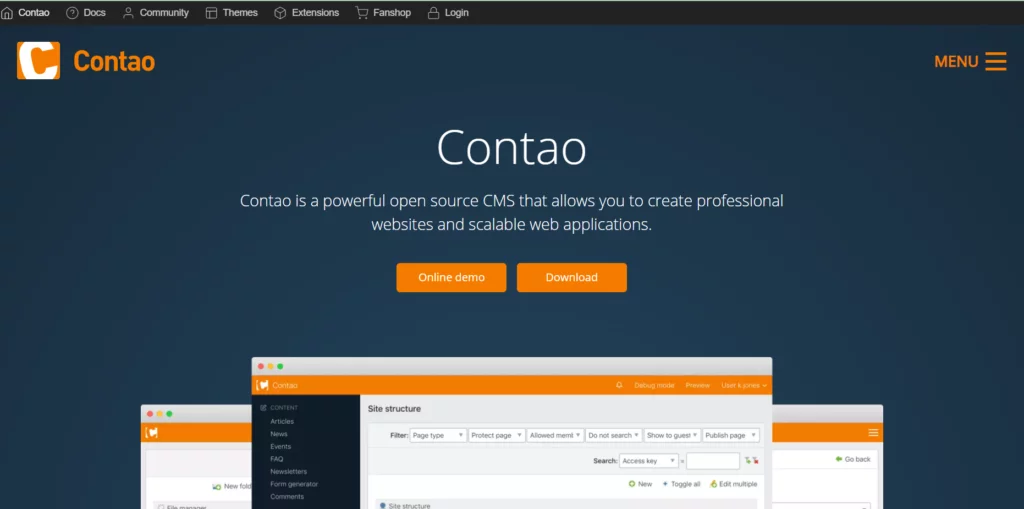
Small to medium-sized websites frequently employ the user-friendly PHP-based CMS Contao. A drag-and-drop layout designer and a potent template engine are among the capabilities it offers for organizing content.
Strong user and developer communities support and contribute to the growth of Contao.
Features:
- An intuitive CMS
- Drag-and-drop content management interface Powerful template engine for designing unique layouts
Pros:
- Simple interface
- Layout editor using drag and drop
- Has an effective template engine
- Thriving developer and user communities
Cons:
- Less scalable than alternative choices
- Less number of plugins and extensions
- For more sophisticated projects, extra development experience can is needed
-
Neos CMS
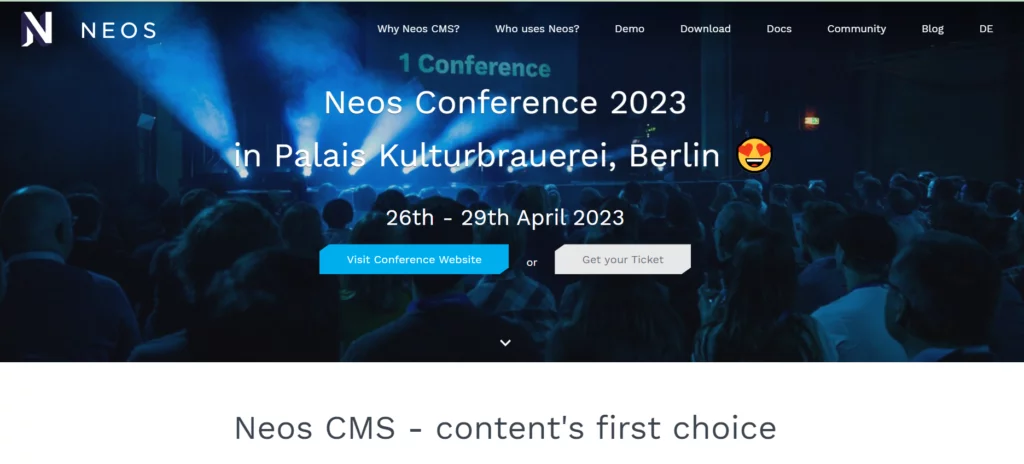
Neos CMS is a cutting-edge, adaptable CMS made with PHP that is renowned for its user-friendly interface and cutting-edge content management features.
A drag-and-drop interface and support for responsive design are just a couple of the capabilities it offers for managing and producing content. Strong user and developer communities support and contribute to the growth of Neos CMS.
Features:
- A contemporary, adaptable CMS
- A drag-and-drop interface and support for responsive design are among the advanced content management features.
- Adaptable user interface
Pros:
- Simple interface
- Modern content management features
- Drag-and-drop software
- assistance with responsive design
Cons:
- Less plugins and extensions are available compared to other choices.
- For more sophisticated projects, extra development experience can be needed.
- Minimal assistance compared to alternative possibilities needed
-
ProcessWire
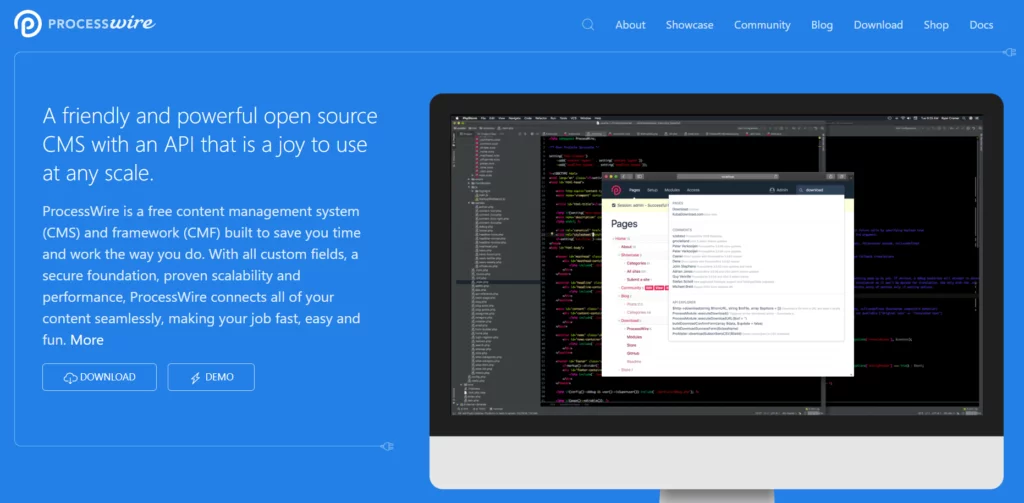
ProcessWire is a PHP-based CMS that is adaptable and adjustable and is renowned for its user-friendly design. A robust template engine and support for sites with many languages are only a couple of the features it offers for content management.
ProcessWire has a robust user and developer community that contributes to its growth and support.
Features:
- Customizable and adaptable CMS
- Strong template engine for developing bespoke layouts Easy and intuitive interface for managing content
- Assistance with multilingual websites
Pros:
- Easy-to-use interface
- flexible and adaptable
- An effective template engine
- Assistance with multilingual websites
Cons:
- Less plugins and extensions are available compared to other choices
- For more sophisticated projects, extra development experience can be needed.
- Minimal assistance compared to alternative possibilities
- ButterCMS
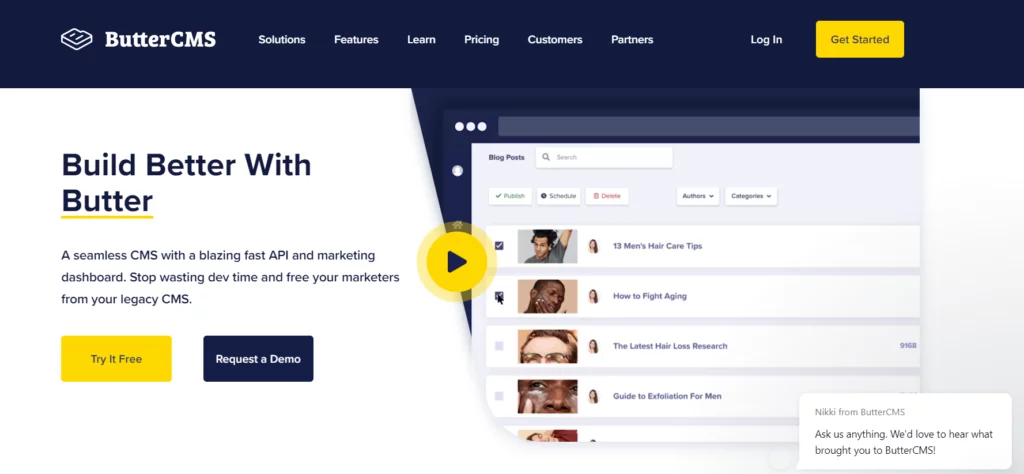
Developers can add content to their websites or applications with the use of the program ButterCMS. It functions like a virtual library where you may keep various kinds of information like news stories, product details, and blog posts.
Being a headless CMS is one of the best things about ButterCMS. This indicates that it offers a condensed API, enabling developers to control content creation and management without worrying about the appearance or structure of their website or application.
Using ButterCMS, you can quickly incorporate dynamic content into your website or application to improve user engagement and personalization.
Ultimately, ButterCMS is a user-friendly platform that may assist developers in better and more effective content management.
Features:
- Adaptable and customizable CMS
- Powerful template engine for creating customized layouts
- Managing content on multilingual websites is made simple and straightforward.
Pros:
- An intuitive interface that is flexible and adaptable
- A powerful template engine
- Support for multilingual websites.
Cons:
- There aren’t as many plugins and extensions as with other options
- It may be necessary to have more development experience for projects that are more complex
- Minimal support in comparison to other options
Conclusion: Best Opensource PHP CMS
Today, there are a number of PHP CMS alternatives, each with its advantages and disadvantages. While Drupal and Joomla offer greater scalability and versatility for more sophisticated projects, WordPress is the most popular CMS and is perfect for beginners and smaller websites.
Magento includes a comprehensive set of tools for handling online sales and was created primarily for e-commerce websites. The ideal PHP CMS for you will ultimately depend on your unique requirements and level of programming experience.
FAQs: Best Opensource PHP CMS
A PHP CMS: What is it?
A content management system created using the PHP programming language is known as a PHP CMS. It enables people to manage, publish, and create digital material without having to have a deep understanding of coding.
What benefits come with utilizing a PHP CMS?
User-friendly interfaces, customization and flexibility, scalability, and strong community support are just a few benefits that PHP CMSs have to offer.
Which of the various PHP CMSs is the best?
There are various PHP content management systems available, each with its unique features and functionalities. Magento, Drupal, Joomla, WordPress, OpenCart, PyroCMS, OctoberCMS, TYPO3, Contao, Neos CMS, ProcessWire, and ButterCMS are some of the top PHP content management systems.
What PHP CMS should I pick for my project?
Consider your unique requirements, your level of experience, the features, and capabilities of each PHP CMS, as well as your demands and experience. Moreover, factors like scalability, customization possibilities, and community support should be taken into account.
Can I build e-commerce websites using a PHP CMS?
Indeed, a number of PHP CMSs, such as Magento and OpenCart, are made expressly for e-commerce websites and provide a number of capabilities for managing online shops.



